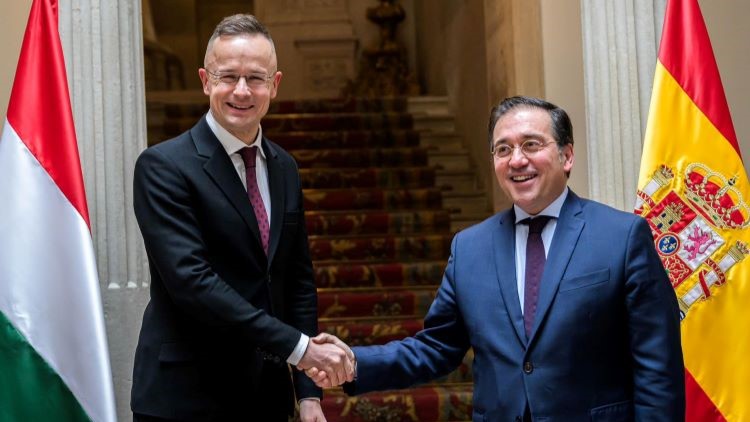Eduardo González
The Minister of Foreign Affairs, José Manuel Albares, received yesterday in Madrid his Hungarian counterpart, Péter Szijjártó, with whom he discussed bilateral relations and the next Magyar Presidency of the Council of the EU, which will put an end to the current Trio of Presidencies initiated by Spain in July 2023.
“Meeting with my Hungarian counterpart, Péter Szijjártó, as a member of the Trio of Presidencies of the Council of the EU,” Albares declared through his official account on the social network X. “We have exchanged about our bilateral relations and about the next Hungarian presidency,” which will begin on July 1, he added. Despite organizing the meeting in Madrid, the Ministry of Foreign Affairs did not call any press conference or provide more information than this brief message through social networks.
For his part, the Magyar minister reported, through his Facebook account, that he had “reviewed” with Albares the “absolutely devastating data: the number of migrants arriving in Spain increased by 82% last year compared to the 2022 data, while in the Canary Islands it increased by 6.5 times.” “We Hungarians know very well what this means for a country, because the pressure is constantly increasing here too,” he continued. “There is no doubt: to protect the future of Europe, a radical change in migration policy is needed,” he concluded.
Hungary has the third turn of the current Trio of Presidencies, which started with Spain between July 1 and December 31, 2023, continues currently with Belgium and will conclude, as of July 1, 2024, with the Budapest Government. It so happens that the Trio mechanism was officially implemented in 2010 through the Treaty of Lisbon and that the first three countries to form a Presidency Trio were, precisely, Spain, Belgium and Hungary, the same as on this occasion.
Each Trio of Presidencies lasts 18 months and, during this period, the three Member States develop common agendas and priorities. Then, each country gives its own interpretation on the matter during its Presidency, but always on the basis of the common program. In statements to the Efe agency, Peter Szijjártó assured yesterday that two of the priorities of the Hungarian Presidency will be “the fight against illegal immigration” and the promotion of the enlargement process towards the Western Balkans. “We would like to change the political focus in Brussels, which is currently in favor of migration, which I think is one of the main factors that attract people to come to Europe,” said Sjijjártó.
Last October, during the Spanish Presidency, pressure from Hungary (and Poland) prevented the inclusion of the migration issue in the so-called “Granada Declaration”, a framework document that aims to promote the debate on “the priorities of the Union for the coming years.” “There is no possibility of having any type of agreement on migration. “Politically it is impossible: not only today, but in general, in the coming years,” declared Hungarian Prime Minister Viktor Orbán at the time.
Spain and the EU
In the same statements to Efe, the Magyar Foreign Minister assured that Hungary maintains relations of “cooperation” with Spain “based on respect”, because there is “no open bilateral debate” between the two countries. “On some European issues we disagree, but we do not consider it a tragedy,” he added.
Despite the minister’s words, Hungary has repeatedly rejected the imposition of mandatory quotas in the European mechanism for the distribution of migrants and refugees, a measure defended by Spain that, in its opinion, would generate “a pull effect.”
Furthermore, the EU as a whole, including Spain, has had serious friction in recent months with Budapest, especially due to the fractious attitude that Orbán has shown towards Russia and Ukraine almost from the beginning of the invasion. The last European Council of the Spanish Presidency, held in December, had to convince Orbán to be absent from the vote to avoid his veto at the start of the accession negotiations for Ukraine and Moldova. In that same Council, the Prime Minister rejected the mid-term review of the Multiannual Financial Framework (MFF), on which the 50 billion euro aid for Ukraine depends, and we had to wait until the first European Council of the Belgian Presidency (end of January) to obtain your consent.
Péter Szijjártó has visited Spain on numerous occasions since he took office ten years ago. Most of these visits were framed in multilateral meetings (meetings of the Southern Neighbourhood, the Union for the Mediterranean and the ministers of Asia-Europe, ASEM, in Barcelona; International Conference in Madrid in 2017, Interministerial Conference of the European Space Agency in Seville, UN High Level Conference on Terrorism in Malaga or 2022 NATO Summit in Madrid), but four bilateral visits have also been recorded (one in 2020, two in 2021 and yesterday).
Albares himself received him in Madrid in October 2021 to address issues of bilateral interest and the European agenda. At that meeting, the Spanish minister highlighted “the importance of the rule of law in Europe” and the Magyar prime minister held a meeting with Santiago Abascal, leader of Vox, before whom he declared that “the example of Spain shows that illegal immigration must be stopped not only on land, but also at sea.”






